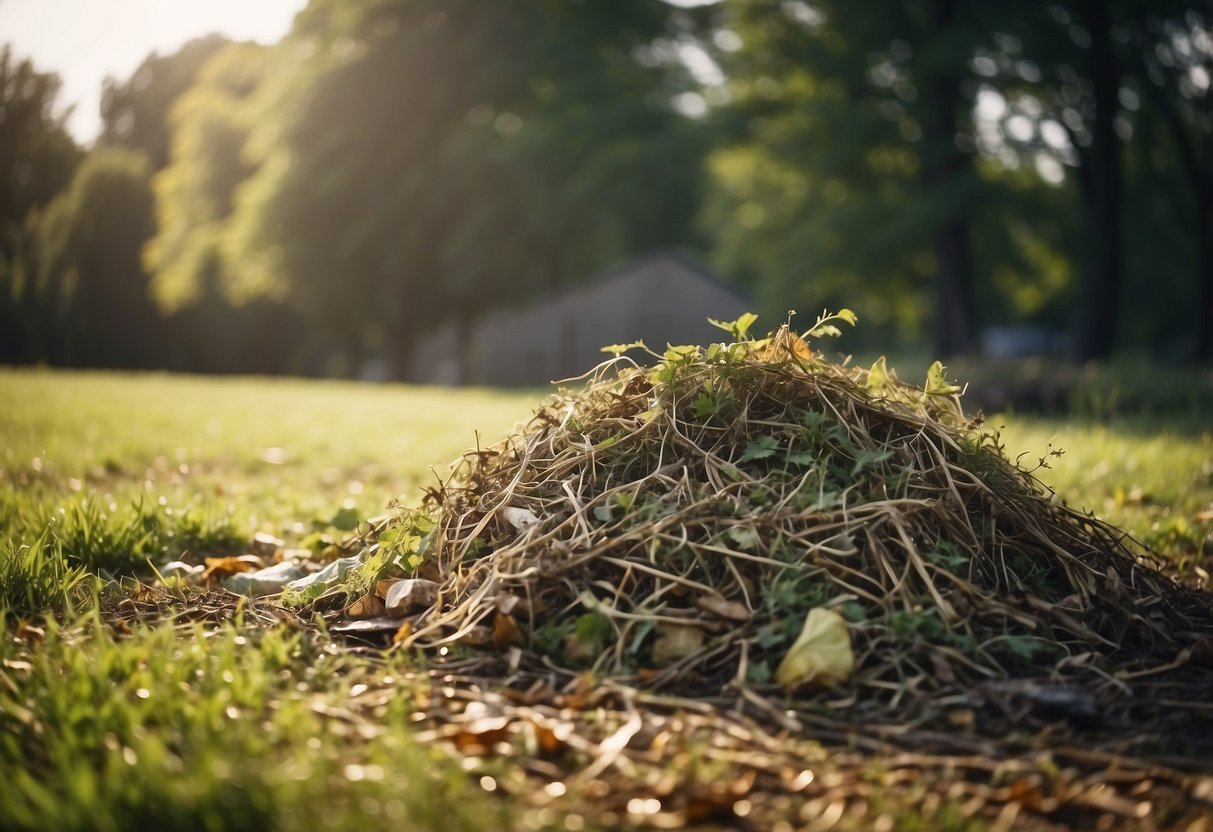Garden Waste Tips: Easy Ways to Reduce and Recycle
Taking care of your garden doesn’t just stop at planting and watering; handling garden waste is vital too. You might wonder, what can you do with all those leaves, grass clippings, and plant debris that pile up? Properly managing garden waste not only benefits your garden but also helps keep our environment clean.

There are numerous ways to recycle and repurpose garden waste. By learning a few simple tips, you can turn what seems like a nuisance into something beneficial. Ready to make your garden both beautiful and eco-friendly? Let’s get started!
1) Use a Compost Bin

Start by gathering organic materials like fruit and vegetable scraps, coffee grounds, and yard trimmings. Avoid adding meat, dairy, or oily foods. These can attract pests.
Layer the materials in your compost bin. Use a mix of dry materials like leaves and green materials like grass clippings. Aim for a ratio of three parts brown to one part green.
Turning your compost regularly helps it break down faster. Use a pitchfork or compost turning tool to mix everything. This will also help with airflow and prevent bad smells.
Keep your compost pile moist but not soggy. This balance is key to effective composting.
2) Try Grasscycling

Grasscycling is a simple way to manage garden waste. Instead of bagging grass clippings, leave them on the lawn after mowing.
This method helps return nutrients to the soil and keeps your garden healthy. Aim to mow your lawn every five to seven days, and make sure the grass is dry. You can find more tips on Grasscycling.
Keep your grass at about 2 to 2 ½ inches for the best results.
3) Mulch Leaves for Soil

Mulching leaves is a smart way to improve your garden soil. When you mulch leaves, you add natural nutrients back into the earth.
Run over fallen leaves with a lawn mower to chop them into small pieces. Spread the leaf mulch evenly over your garden beds.
The small bits will decompose, feeding your soil. This helps keep your plants healthy and happy. To learn more about these benefits, visit Tips for Mulching Leaves.
Remember to avoid piling the mulch too thickly to prevent mold. This simple process can make a big difference in your garden’s health.
4) Create Leaf Mold

Creating leaf mold is simple and useful for your garden. Start by collecting fallen leaves from your yard.
You can either pile the leaves in a corner or place them in a wood or wire bin. Moisten the leaves slightly to help them decompose.
Check the moisture level occasionally. If the leaves get too dry, add some water.
After several months, the leaves will break down into rich, crumbly leaf mold, perfect for improving your soil. For more details, check out these tips.
5) Start a worm bin

Starting a worm bin is a great way to turn your kitchen scraps into rich compost for your garden. Begin by getting a suitable container, like a plastic bin.
Add bedding material such as shredded cardboard or paper, which has been soaked and wrung out to feel like a damp sponge. Place this bedding at the bottom of the bin.
Introducing red worms to your bin will speed up the composting process. Feed them small amounts of fruit and veggie scraps. Keep the bin in a cool, dark place to ensure the worms stay active and healthy. Learn more about worm composting here.
6) Shred Branches for Mulch

Shredding branches into small pieces creates great mulch for your garden.
Use a garden shredder to break down twigs and limbs into usable mulch.
Feed branches into the shredder to create fine mulch, which helps soil retain moisture and adds nutrients.
Keep your garden healthy and beautiful by shredding branches.
7) Donate garden tools

Do you have old garden tools lying around? Don’t let them gather dust. Donating them can help others and reduce waste.
You can give items like shovels, hand tools, tillers, cultivators, and even lawn mowers to charities or community gardens. This way, your unused tools can support gardeners in your community. For more information, visit this guide on donating garden tools.
Local programs and organizations often welcome such donations. It’s a great way to help others and keep your unused items out of the landfill.
8) Use Biodegradable Bags

Using biodegradable bags in your garden is a great way to reduce waste. These bags break down naturally, helping the environment.
You can use them for soil and compost materials. They blend well with organic waste, speeding up decomposition.
Biodegradable bags can also double as mulch, enriching your soil. They are versatile and eco-friendly.
9) Build a DIY Compost Tumbler

You can easily turn your kitchen scraps and yard waste into nutrient-rich compost by building a DIY compost tumbler.
First, gather materials like a 35-gallon garbage can and some nuts and bolts. Cut a door panel slightly smaller than the width of your wheelbarrow.
Next, add reinforcements using flat aluminum stock around the drum. Attach casters to help your tumbler spin. Find detailed instructions for assembly in this guide by HGTV. Happy composting!
10) Collect Rainwater

Collecting rainwater for your garden is simple and eco-friendly. Use barrels or large containers to catch rain from your roof. This helps you save water and money.
Make sure your containers are clean. Place them under downspouts to maximize collection. Use a fine mesh to cover them. This keeps out leaves and debris.
You can then use the water on your plants. It’s fresh and free, and plants love it. Learn more about collecting rainwater from Farmers’ Almanac for detailed steps.
Importance Of Proper Garden Waste Disposal

Proper garden waste disposal is crucial for both protecting the environment and following legal requirements. It not only helps reduce your carbon footprint but also ensures that you comply with local waste management laws.
Environmental Benefits
Managing your garden waste correctly has significant environmental benefits. It helps reduce the volume of waste that ends up in landfills. By composting green waste, like grass clippings and leaves, you can create valuable compost that enriches your soil.
Proper disposal methods also prevent harmful chemicals from entering the ground and water systems. Garden waste, when treated correctly, releases fewer greenhouse gases compared to being left in landfills. This contributes to a healthier planet for you and future generations.
Legal Regulations
Adhering to legal regulations regarding garden waste disposal is essential. Many local governments have specific guidelines for how to handle garden waste. These guidelines can include schedules for waste collection or rules for composting.
By following these rules, you avoid potential fines and legal issues. It also ensures that your community’s waste management system runs efficiently. Local curbside collection services and drop-off centers are often provided to help you stay compliant. Check your area’s regulations to make sure you’re meeting all requirements.
Methods For Managing Garden Waste

Reducing garden waste in eco-friendly ways can help you maintain a tidy garden while benefiting the environment. Two effective methods include composting at home and utilizing green waste bins.
Composting At Home
Composting is a great way to recycle organic waste from your garden. You can start with a simple compost bin or pile. Add vegetable scraps, leaves, and grass clippings to create rich compost for your soil.
To maintain your compost, balance “green” materials like vegetable scraps with “brown” materials like dry leaves and twigs. This balance helps break down waste efficiently. Turn the pile regularly to provide oxygen, which speeds up decomposition.
Starting a compost pile is easy and reduces the amount of waste you send to landfills. Plus, the compost you produce is great for improving soil health and garden fertility. This makes it a sustainable and beneficial practice for any gardener.
Using Green Waste Bins
Green waste bins are another convenient method for managing garden waste. These bins are provided by many local councils to collect organic waste like leaves, branches, and grass clippings. Check with your local council about collection schedules and guidelines for what can be included.
To use green waste bins effectively, make sure you only include accepted materials. Avoid adding any plastic, metal, or other non-organic substances. This helps ensure that the waste can be properly composted at municipal facilities.
Using green waste bins keeps your garden tidy and ensures that large volumes of organic waste are processed in an eco-friendly manner. By participating in this program, you contribute to community efforts in sustainable waste management.
Tips For Reducing Garden Waste

Reducing garden waste can help you create a more sustainable garden. You can achieve this by making smart landscaping choices and using effective seasonal cleanup strategies.
Smart Landscaping Choices
Choosing plants that are well-suited to your local conditions is crucial. This reduces the chances of plant failure and waste. Opt for native plants; they require less water and maintenance. Another option is to plant perennials instead of annuals. Perennials come back every year, cutting down on the plants you’ll need to buy each season.
You should also use mulching. Mulch helps retain moisture, limits weed growth, and enriches the soil as it decomposes. Use organic mulch like leaves, grass clippings, or wood chips. This makes your garden more self-sustaining and reduces the amount of green waste.
Seasonal Cleanup Strategies
During seasonal changes, garden waste can pile up. To manage this, start composting. When you compost, you turn leaves, plant clippings, and kitchen scraps into nutrient-rich soil. This reduces the amount of waste that goes to landfills.
Another strategy is to reduce high-maintenance plants that need regular pruning or clearing. Instead, plant vegetables that grow well in your area and can be used in your kitchen. Try to reuse and recycle plant waste whenever possible. For instance, use branches and leaves to make compost tea or mulch for your garden beds.
By following these smart landscaping and seasonal cleanup strategies, you can significantly reduce garden waste and maintain a beautiful, eco-friendly garden.







